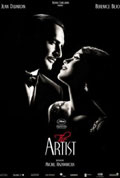
Directed by
Michel Hazanavicius
100 minutes
Rated PG
Reviewed by
Bernard Hemingway

The Artist
Synopsis: Hollywood, 1927: Silent movie star George Valentin (Jean Dujardin) is at the peak of his popularity but the talkies are about to change all that.When talking pictures arrived on the scene (The Jazz Singer, 1927, is usually treated as the first sound film) they were widely regarded, including by the studios, as a flash-in-the-pan novelty. This view was quickly proven wrong and virtually overnight silent movies were dead, along with the careers of many of the stars of the era. This is the theme of The Artist. Its particular twist is that it too is silent, or at least largely so.
Making a silent film today is, needless to say, a brave move and writer-director Michael Hazanavicius deserves credit for a charming film that skilfully draws on the now-quaint staging techniques of the bygone era, including a constantly signifying musical accompaniment and the use of inter-titles. But as we see when George plays some of the rushes from his old film, The Artist is technically much more sophisticated that its predecessors, or in other words it conforms to modern cinematic standards in terms of film quality, camera movement, editing and so forth. I also doubt that the term “loser” or the rude finger were part of everyday lingo in the 1920s.
Cbarming as it is, The Artist is, albeit aptly, no more than an old-fashioned boy-meets-girl romance. This means that it relies entirely on its cheeky concept for its success. Whilst there is undeniable pleasure to be had from being “in on the game”, this film buffs' frisson and the appreciation of Hazanavicius’s technical skills, largely accounts for what the film has to offer. There were essentially two reasons that it was felt that the talkies would fail. One was that movies were regarded as a series of still photographs (which objectively they are) and that it was the film-maker’s art to tell his story in a purely visual form. This, as its title suggest, is dealt with by The Artist, with Hazanavicius fulfilling that expectation handsomely. The second reason was that it was commonly held that audiences would not want to hear the stars speak as this would negate their mystique. Indeed some of the stars of the period, both male and female, had completely unsuitable voices (so amusingly portrayed in Singin' In The Rain) and they were unceremoniously discarded. This aspect is not dealt with here and other than his stubbornness there is no apparent reason why Valentin is dropped by his studio. As we briefly hear at the film’s end he has a classically Charles Boyer-like French accent and should have been a sure-fire hit with the ladies. This tends to make his downfall rather inexplicable but then there is nothing about the film that approaches dramatic realism
Unquestionably novel, impressively well-made and ceaselessly charming with Jean and Bérénice Bejo both delightful in the leads (Dujardin won the Best Actor Oscar), The Artist is an enjoyable if ultimately slight film. It is somewhat surprising that it won the Best Picture Oscar and Hazanavicius Best Director, beating off Terrence Malick's The Tree Of Life and Scorsese's Hugo.

Want more about this film?


Want something different?




